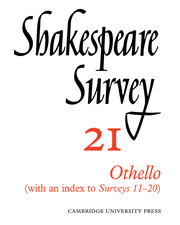Book contents
- Frontmatter
- ‘Othello’: A Retrospect, 1900–67
- The Two Parts of ‘Othello’
- ‘Othello’: A Tragedy Built on a Comic Structure
- ‘Othello’ and the Pattern of Shakespearian Tragedy
- ‘Othello’, ‘Lepanto’ and the Cyprus Wars
- Iago—Vice or Devil?
- Thomas Rymer and ‘Othello’
- Delacroix’s Tragedy of Desdemona
- Verdi’s ‘Otello’: A Shakespearian Masterpiece
- William Hervey and Shakespeare’s Sonnets
- Imagery and Irony in ‘Henry V’
- Shakespeare and the Actors: Notes towards Interpretations
- The Year's Contributions to Shakespearian Study 1 Critical Studies
- 2 Shakespeare’s Life, Times and Stage
- 3 Textual Studies
- Index to Volume 21
- General Index to Volumes 11–20
- Plate Section
Shakespeare and the Actors: Notes towards Interpretations
Published online by Cambridge University Press: 28 March 2007
- Frontmatter
- ‘Othello’: A Retrospect, 1900–67
- The Two Parts of ‘Othello’
- ‘Othello’: A Tragedy Built on a Comic Structure
- ‘Othello’ and the Pattern of Shakespearian Tragedy
- ‘Othello’, ‘Lepanto’ and the Cyprus Wars
- Iago—Vice or Devil?
- Thomas Rymer and ‘Othello’
- Delacroix’s Tragedy of Desdemona
- Verdi’s ‘Otello’: A Shakespearian Masterpiece
- William Hervey and Shakespeare’s Sonnets
- Imagery and Irony in ‘Henry V’
- Shakespeare and the Actors: Notes towards Interpretations
- The Year's Contributions to Shakespearian Study 1 Critical Studies
- 2 Shakespeare’s Life, Times and Stage
- 3 Textual Studies
- Index to Volume 21
- General Index to Volumes 11–20
- Plate Section
Summary
This article is in three parts. The first discusses the acting (but particularly the speaking) of Gielgud and Olivier; the second attempts an analysis of Paul Scofield in the context of his Macbeth; the third is, in the main, a transcript of part of a tape-recorded conversation between Ian Richardson and myself.
The justification for the contents is the unusual opportunity presented recently to compare the work of two actors of the older generation and that of a midway and a younger generation. The film of Olivier's Othello followed by the recorded version (on which my analysis is based), a recital at the Royal Shakespeare Theatre when Gielgud enacted the deposition speech from Richard II (my analysis is based on this and the recording), Scofield's Macbeth and Richardson's Coriolanus and Malcolm-—these are the themes which came together and suggested my approach.
- Type
- Chapter
- Information
- Shakespeare Survey , pp. 115 - 126Publisher: Cambridge University PressPrint publication year: 1969

